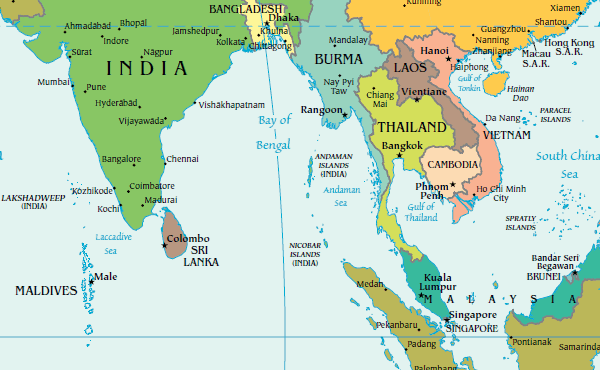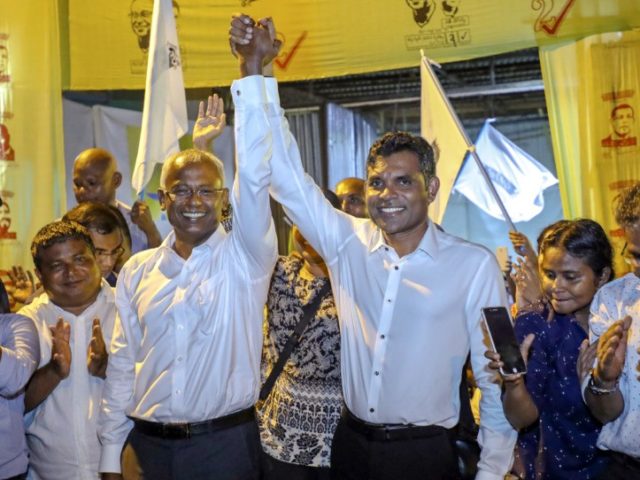This morning’s key headlines from GenerationalDynamics.com
- Maldives in crisis as China-backed incumbent president Yameen loses election
- Yameen’s defeat is also a defeat for China’s ‘debt trap diplomacy’
Maldives in crisis as China-backed incumbent president Yameen loses election

Map showing strategic location of Maldives and Sri Lanka in the Indian Ocean
People in the Maldives islands today are in something of a shock, as the results of Sunday’s presidential elections appear to indicate that the incumbent president Abdulla Yameen has decisively lost to his opponent, Ibrahim Mohamed Solih.
With more than 80 percent of the ballots counted on Sunday night, Solih was winning by 58-41 percent of the vote. The results will be announced officially on Friday, but this 17 percent lead is thought to be insurmountable.
The Maldives is a 1,200 island archipelago in the Indian Ocean at the southern tip of India. More than 260,000 of the Maldives’ 400,000 people were eligible to vote at about 400 polling stations across the islands. Voters also stood in long lines in Malaysia, the U.K., India, and Sri Lanka, where the opposition had encouraged overseas Maldivians to participate.
The reason that everyone was expecting Yameen to win easily is that he has used violence, human rights abuse, and suppression to guarantee his victory. He jailed many of his political opponents on phony “terrorism” charges and rolled back press freedom.
Some political opponents have been in jail since 2015, including Yameen’s own half-brother. In February of this year, the Supreme Court ruled that they should be set free. Yameen first announced that he would honor the court’s decision, but then changed his mind. He declared a national state of emergency and sent the police to arrest two of judges. The other three judges then decided that they would reverse their decision and leave the political opponents in jail.
On Saturday evening, the night before the election, police raided the main campaign office of the opposition presidential candidate Ibrahim Mohamed Solih on Saturday, saying they had acted to prevent “illegal activities.”
Even so, Sunday’s election went a lot better than anyone expected, without a lot of obvious election-rigging, because the United States and the European Union had threatened sanctions. The European Union said in July it was ready to impose travel bans and asset freezes on individuals if the situation did not improve. The U.S. State Department this month warned it would “consider appropriate measures” if the election was not free and fair.
Solih declared victory on Sunday evening:
This is a moment of happiness, a moment of hope, a moment of history. For many of us this has been a difficult journey, a journey that has led to a prison cells or years of exile.
It’s been a journey of a breakdown of government institutions. But it’s also been a journey that has ended at the ballot box. I must thank all those people who have struggled for this cause.
However, Yameen has not made any statement. There is a great deal of tension and a sense of crisis in Malé, the capital city, because many people are afraid that Yameen will do something violent in the next couple of days to reverse the election results. Mihaaru.com (Maldives) and Washington Post and Al Jazeera and CNN
Yameen’s defeat is also a defeat for China’s ‘debt trap diplomacy’
Both Sri Lanka and the Maldives, both in the Indian Ocean just south of the tip of India, have long had close relationships with India. However, both countries have become closer to China in the last ten years, alarming India.
The debt trap story of Sri Lanka has been told many times. China funded the development of Sri Lanka’s Hambantota seaport, and when Sri Lanka could not pay its debt, China took control of the seaport and substantial land in the region, creating a large enclave of Chinese workers and their families.
Many in the Maldives are acutely aware of what happened to Sri Lanka, of course, and they are afraid that Abdulla Yameen has already put their country on the same course, with a debt trap of its own. Already, China has loaned $830 million for an upgrade to the airport. The Chinese are also building a 25-story apartment complex and a hospital. These Chinese projects account for some 70 percent of the country’s total debt, and $92 million a year in payments to China, roughly 10 percent of the entire budget.
Then there is the question of corruption. In 2014-15, Yameen’s tourism minister leased out more than 50 islands and lagoons to developers without public bidding. There are signs that members of Yameen’s own family are heavily involved in China’s infrastructure projects.
We have written about many countries where the leaders refuse to step down, and corruption is often the reason. Typically, the leader’s family and cronies benefit from fat kickbacks and bribes, but those are never revealed as long as the leader is in power and can use violence and human rights abuses to suppress that information. But once somebody else takes power, the corruption can be revealed, and the cronies become eligible to be jailed or executed.
So that is another reason why some people fear a major crisis in the Maldives in the next few days. If Yameen has followed this corruption path, and there are signs that he has, then turning power over to Solih puts himself, his family and his cronies at risk of losing their freedom or their lives. Guardian (London) and BBC and Foreign Policy (21-Mar) and AFP
Related Articles:
- Maldives crisis pits India vs China in the Indian Ocean (07-Feb-2018)
- Pakistan faces imminent financial crisis threatening China’s CPEC (07-Aug-2018)
- Pakistan overwhelmed and China alarmed over the China-Pakistan Economic Corridor (CPEC) (12-Dec-2017)
- China takes control of strategic Hambantota seaport in Sri Lanka, raising concerns in India (11-Dec-2017)
- China establishes its first foreign military base, in Djibouti (13-Jul-2017)
KEYS: Generational Dynamics, Maldives, Abdulla Yameen, Ibrahim Mohamed Solih, China, Sri Lanka, Hambantota seaport
Permanent web link to this article
Receive daily World View columns by e-mail

COMMENTS
Please let us know if you're having issues with commenting.